Best Fitbit Watches [Key Factors To Consider]
Note: This page contains affiliate links.
As an Amazon Associate, I earn from qualifying purchases when you click on the link, but you are not charged extra.
Fitbit watches have revolutionized the way we approach health and fitness, providing users with a sleek, stylish, and functional accessory that goes beyond just telling time. With a plethora of features designed to monitor physical activity, heart rate, sleep patterns, and even stress levels, these smartwatches cater to a wide range of fitness enthusiasts-from casual walkers to serious athletes. Choosing the right Fitbit can be overwhelming due to the variety of models available, each offering unique functionalities tailored to different lifestyles and fitness goals.
In this comprehensive buyer’s guide, we will explore the key factors to consider when purchasing a Fitbit watch, including essential features, compatibility with mobile devices, battery life, and price range. Whether you’re looking to track your daily steps, monitor your heart rate during workouts, or enhance your overall well-being, our guide will help you navigate the options available in the Fitbit lineup. By understanding the strengths and capabilities of each model, you can make an informed decision that aligns with your health journey.
Best Fitbit Watches: Quick Comparison Table
| Features | Pros | Cons | |
|---|---|---|---|
Fitbit Blaze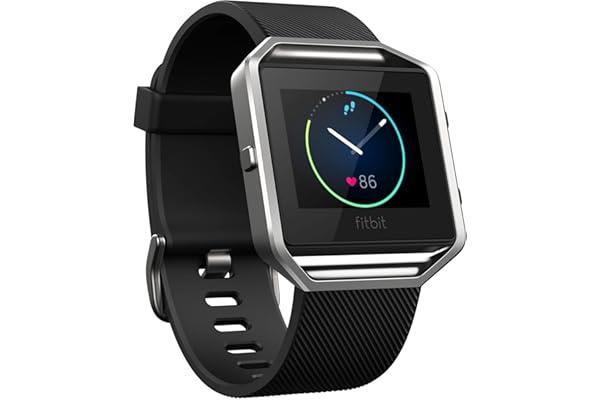 Check Price Check Price |
|
|
|
Fitbit Blaze (Small Version)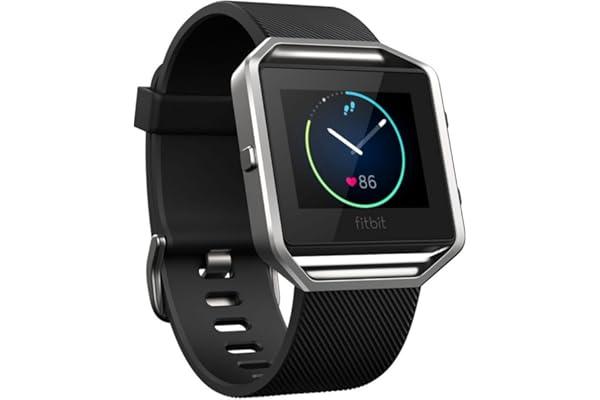 Check Price Check Price |
|
|
|
Fitbit Charge 5 Bundle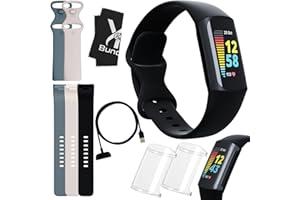 Check Price Check Price |
|
|
|
Fitbit Sense 2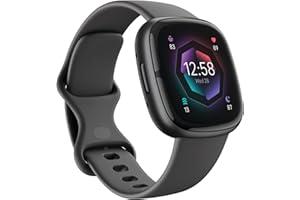 Check Price Check Price |
|
|
|
Fitbit Sense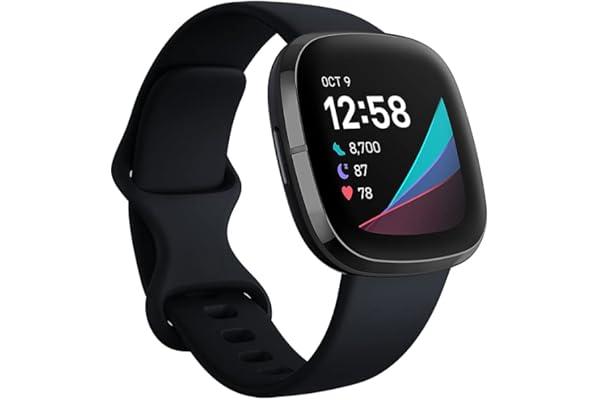 Check Price Check Price |
|
|
|
Fitbit Versa 2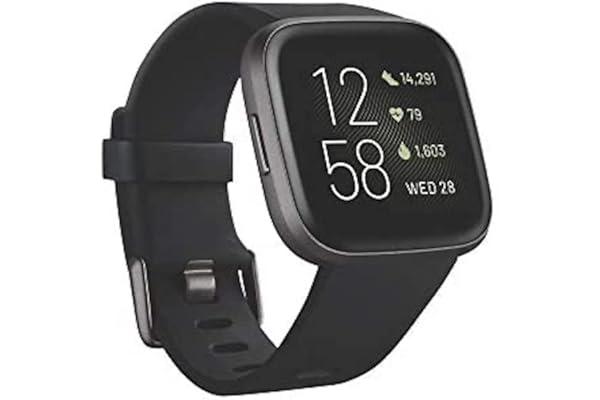 Check Price Check Price |
|
|
|
Fitbit Versa 3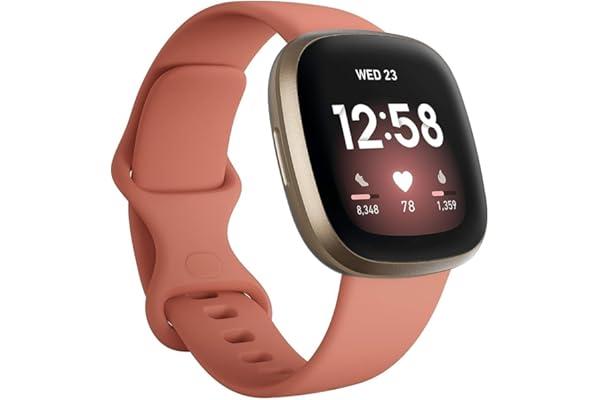 Check Price Check Price |
|
|
|
Fitbit Versa 4 Check Price Check Price |
|
|
|
Fitbit Versa Special Edition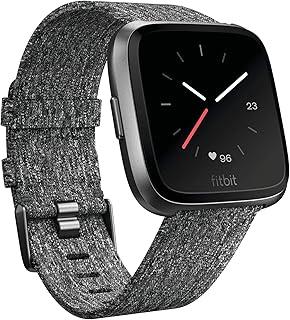 Check Price Check Price |
|
|
|
Game Time Cincinnati Reds Engraved Silicone Sport Watch Band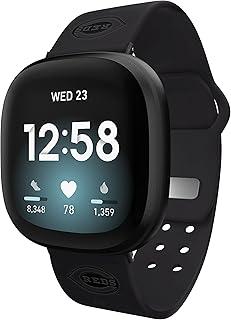 Check Price Check Price |
|
|
|
Recommendations For Best Fitbit Watches
Fitbit Blaze
The Fitbit Blaze is a versatile smartwatch designed to help users track their fitness and health while maintaining a stylish appearance. With a large touchscreen display and customizable watch faces, the Blaze seamlessly transitions from workout sessions to everyday use. Its features include multi-sport tracking, smart notifications, and comprehensive activity monitoring, making it an ideal companion for fitness enthusiasts. However, users should note the limited app ecosystem and the absence of built-in GPS.
Features:
- Color: Black and Silver
- Large Size (Fits wrist sizes 6.7 to 8.1 inches)
- Touchscreen display
- Activity and heart rate tracking
- Smart notifications
- Multi-sport tracking
Pros:
- Stylish design suitable for everyday wear
- Comprehensive fitness tracking features
- Large, easy-to-read display
- Customizable watch faces
Cons:
- Battery life could be better, lasting around 5 days
- Limited app selection compared to competitors
- No built-in GPS
Fitbit Blaze (Small Version)
The Fitbit Blaze (Small Version) offers the same extensive fitness tracking features as its larger counterpart while catering to individuals with smaller wrists. This smartwatch provides users with a stylish way to monitor their health and activity levels, featuring a touchscreen display and smart notifications. Although it excels in tracking various activities, it lacks built-in GPS and has a limited app selection.
Features:
- Color: Black and Silver
- Small Size (Fits wrist sizes 5.5 to 6.7 inches)
- Touchscreen display
- Activity and heart rate tracking
- Smart notifications
- Multi-sport tracking
Pros:
- Compact design for smaller wrists
- Comprehensive fitness tracking features
- Large, easy-to-read display
- Customizable watch faces
Cons:
- Battery life could be better, lasting around 5 days
- Limited app selection compared to competitors
- No built-in GPS
Fitbit Charge 5 Bundle
The Fitbit Charge 5 Bundle is an advanced fitness tracker designed for users looking to optimize their health and wellness. It features built-in GPS, a heart rate monitor, and a variety of health management tools, including stress management and sleep tracking. The bundle comes with additional accessories like screen protectors and extra bands, enhancing its usability. While it offers an impressive array of features, casual users may find it overwhelming, and it is limited to the Fitbit ecosystem.
Features:
- Color: Black and Graphite
- Built-in GPS
- Daily Readiness Score
- Stress management tools
- Heart rate monitor
- Sleep tracking
Pros:
- Advanced health metrics and tracking features
- Includes useful accessories like screen protectors and extra bands
- Long battery life of up to 7 days
- Lightweight and comfortable design
Cons:
- May be too feature-rich for casual users
- Limited to Fitbit’s ecosystem
- No music storage
Fitbit Sense 2
The Fitbit Sense 2 is a sophisticated smartwatch tailored for health-conscious users. It boasts advanced features such as an ECG app, SpO2 monitoring, and built-in GPS, making it an all-in-one device for fitness and health tracking. With its stylish design and extensive health management tools, users can monitor stress levels and heart health efficiently. Although it comes at a higher price point, the features and battery life justify the investment for serious fitness enthusiasts.
Features:
- Color: Shadow Grey and Graphite
- ECG app for heart health
- SpO2 monitoring
- Built-in GPS
- 24/7 heart rate tracking
- Stress management tools
Pros:
- Comprehensive health tracking capabilities
- High-quality build and stylish design
- Excellent battery life of up to 6 days
- Includes additional bands for personalization
Cons:
- More expensive than other Fitbit models
- Setup and syncing can be complex
- Not as many third-party apps available
Fitbit Sense
The Fitbit Sense is designed for users seeking advanced health insights, featuring tools for heart health, stress management, and skin temperature trends. Its sleek design and interchangeable bands cater to a variety of styles. Users benefit from 24/7 heart rate tracking, though the complexity of features may deter casual fitness enthusiasts. While it offers extensive monitoring capabilities, it is priced higher than simpler models.
Features:
- Color: Carbon Graphite
- Skin temperature tracking
- Heart health monitoring tools
- Stress management features
- 24/7 heart rate tracking
- One size with S and L bands included
Pros:
- In-depth health monitoring features
- Stylish and modern design
- Good battery life (around 6 days)
- Customizable with interchangeable bands
Cons:
- Higher cost compared to basic models
- Limited third-party app integration
- May be overly complex for casual users
Fitbit Versa 2
The Fitbit Versa 2 is a versatile smartwatch that combines fitness tracking with smart features like built-in Alexa. Users can monitor heart rate, sleep quality, and even swim performance, making it a comprehensive tool for health management. Its stylish design allows for daily wear, and the battery life lasts up to five days. While it offers a robust set of features, it does have a limited app selection and lacks built-in GPS.
Features:
- Color: Black and Carbon
- Built-in Alexa
- Heart rate monitoring
- Sleep and swim tracking
- Music storage and playback
Pros:
- Great integration with Alexa for hands-free control
- Excellent sleep tracking features
- Good battery life (up to 5 days)
- Stylish and versatile design
Cons:
- Limited app selection
- No built-in GPS
- Music playback limited to certain services
Fitbit Versa 3
The Fitbit Versa 3 is a powerful health and fitness smartwatch equipped with built-in GPS, allowing users to track outdoor activities accurately without needing a phone. With 24/7 heart rate monitoring and Alexa integration, it combines functionality with style. Its long battery life of up to six days ensures it can keep up with an active lifestyle. Although it is competitively priced, potential users should be aware of some limitations in app selection and occasional syncing issues.
Features:
- Color: Pink and Gold
- Built-in GPS
- 24/7 heart rate tracking
- Voice assistant with Alexa
- Long battery life (up to 6 days)
Pros:
- Built-in GPS for accurate tracking of outdoor activities
- Long-lasting battery
- Alexa integration for convenience
- Stylish design suitable for various occasions
Cons:
- Price may be high for some users
- App selection still limited compared to competitors
- Some users report syncing issues
Fitbit Versa 4
The Fitbit Versa 4 is a state-of-the-art fitness smartwatch designed for serious athletes and fitness enthusiasts. It offers comprehensive tracking capabilities with built-in GPS, 24/7 heart rate monitoring, and access to 40 exercise modes. The Daily Readiness Score feature helps users optimize their workouts based on recovery metrics. Despite its premium features, users should note the higher price point and limited support for third-party apps.
Features:
- Color: Black and Graphite
- Daily Readiness Score
- Built-in GPS
- 24/7 heart rate tracking
- 40 exercise modes
- Sleep tracking
Pros:
- Comprehensive fitness tracking capabilities
- Daily Readiness Score helps optimize workouts
- Good battery life
- Stylish and lightweight design
Cons:
- Higher price point than earlier models
- Limited third-party app support
- Some features may require subscription
Fitbit Versa Special Edition
The Fitbit Versa Special Edition combines functionality with style, featuring a unique woven band and the convenience of Fitbit Pay for contactless payments. It offers robust health and fitness tracking features, including 24/7 heart rate and sleep monitoring. The elegant design makes it suitable for both workouts and everyday wear. However, it has limited app support and lacks built-in GPS, which may be drawbacks for some users.
Features:
- Color: Charcoal Woven
- Stylish woven band
- Fitbit Pay for contactless payments
- 24/7 heart rate tracking
- Sleep tracking
Pros:
- Elegant design suitable for various occasions
- Convenient Fitbit Pay feature
- Good tracking capabilities
- Comfortable to wear
Cons:
- Limited app ecosystem
- No built-in GPS
- Higher cost than standard models
Game Time Cincinnati Reds Engraved Silicone Sport Watch Band
The Game Time Cincinnati Reds Engraved Silicone Sport Watch Band is a must-have for avid fans of the Cincinnati Reds. Made from durable silicone, this band is designed for active lifestyles while showcasing your team spirit. It is compatible with the Fitbit Versa 3 and Sense and features an adjustable fit for maximum comfort. While its unique branding may limit its appeal to non-fans, it offers an excellent choice for showcasing team loyalty.
Features:
- Material: Silicone
- Engraved Cincinnati Reds logo
- Compatible with Fitbit Versa 3 and Sense
- Adjustable fit for comfort
Pros:
- Durable silicone material suitable for sports
- Unique team branding for fans
- Comfortable and adjustable fit
- Easy to install and remove
Cons:
- Limited to Cincinnati Reds branding
- May not fit all wrist sizes perfectly
- Not suitable for formal occasions
What To Consider When Choosing Fitbit Watches
When it comes to selecting the perfect Fitbit watch, a variety of factors come into play, catering to individual preferences, fitness goals, and lifestyle needs. With a wide array of models available, understanding the unique features and functionalities of each is crucial. Below are some key considerations to guide your choice:
1. Fitness Goals And Tracking Needs
Different Fitbit models cater to different fitness levels and goals. If you are an avid runner, you might benefit from models with advanced GPS capabilities, such as the Fitbit Charge 5 or Fitbit Sense. These watches provide real-time pace and distance tracking, helping you analyze your performance during runs. Conversely, if your goal is to lead a more active lifestyle with general activity tracking, a simpler model like the Fitbit Inspire 3 might suffice. Understanding your fitness aspirations is essential in selecting a watch that aligns with your ambitions.
2. Health Monitoring Features
Fitbit watches are renowned for their comprehensive health monitoring capabilities. From heart rate monitoring to stress management, sleep tracking, and even SpO2 (blood oxygen) measurements, these features can significantly impact your overall well-being. For instance, the Fitbit Sense offers an ECG app that can help detect signs of atrial fibrillation, making it an excellent choice for those who prioritize heart health. If you’re particularly interested in sleep quality, look for models that offer advanced sleep tracking, including sleep stages and insights into your sleep patterns.
3. Battery Life And Charging
The battery life of a Fitbit watch can vary significantly between models, with some lasting up to six days or more on a single charge, while others may require more frequent recharging, especially when using GPS or extensive health monitoring features. If you lead a busy lifestyle or travel often, a longer battery life may be a priority, allowing you to track your activities without the hassle of daily charging. Additionally, consider how long it takes to recharge the device. Models that support fast charging can be particularly advantageous for those with limited time.
4. Design And Comfort
A Fitbit watch is something you’ll likely wear daily, so comfort and style are essential considerations. Fitbit offers a variety of designs, from sleek and sporty to more elegant styles suitable for formal occasions. Additionally, the size and weight of the watch can impact your comfort during workouts or daily wear. Consider whether you prefer a larger display for easier readability or a more discreet option that blends seamlessly with your wardrobe. Many models also offer interchangeable bands, allowing you to customize the look of your watch to suit different outfits and occasions.
5. Smart Features And Compatibility
Beyond fitness tracking, many Fitbit watches come equipped with smart features, including notifications for calls, texts, and app alerts. If staying connected is important to you, ensure that the model you choose supports these features and is compatible with your smartphone’s operating system, whether it be iOS or Android. Additionally, some models allow for music storage and control, enabling you to enjoy your favorite tunes while exercising without needing to carry your phone. Exploring these smart functionalities can enhance your overall experience with the device.
6. Budget Considerations
Fitbit offers a range of watches at various price points, so it’s crucial to determine your budget before diving into your search. While higher-end models like the Fitbit Sense or Fitbit Charge 5 come with advanced features and technology, more affordable options like the Inspire 3 still provide solid tracking capabilities for those on a budget. Evaluate which features are most important to you and find a model that offers the best value for your investment.
7. User Reviews And Recommendations
Finally, exploring user reviews and recommendations can provide valuable insights into the performance and durability of different Fitbit models. Real-world experiences can highlight any potential issues or strengths that may not be apparent from product specifications alone. Online forums and consumer reviews can be excellent resources for gathering information about the experiences of other users and their satisfaction with specific models.
Choosing the right Fitbit watch involves a careful consideration of your unique lifestyle, fitness goals, and personal preferences. With the wide range of models available, from the feature-rich Fitbit Sense to the straightforward Inspire 3, there is an option for everyone. By taking into account your fitness ambitions, health monitoring needs, design preferences, battery life, and budget, you can find a device that not only meets your tracking needs but also enhances your daily life.
Ultimately, a Fitbit watch serves as more than just a fitness tracker; it becomes a companion in your journey towards better health and well-being. By equipping yourself with the right tools and insights, you can stay motivated and informed, paving the way for a healthier, more active lifestyle. Whether you’re stepping into the world of fitness for the first time or looking to elevate your existing routine, the right Fitbit watch can be an invaluable partner in achieving your goals and nurturing your overall wellness.
Benefits Of Owning Fitbit Watches
Fitbit watches have become a household name in the realm of fitness and health monitoring, transforming the way individuals track their daily activities and overall well-being. The advantages of owning a Fitbit watch are vast and multifaceted, appealing to a wide range of users, from fitness enthusiasts to those simply looking to maintain a healthier lifestyle. Here’s an in-depth exploration of the key benefits that come with using a Fitbit watch.
1. Comprehensive Health Monitoring
One of the standout features of Fitbit watches is their ability to monitor various health metrics comprehensively. Users can track their heart rate continuously, providing valuable insights into cardiovascular health. This real-time heart rate data helps users optimize their workouts, manage stress levels, and monitor their resting heart rate, which is crucial for assessing overall fitness.
Fitbit devices also offer advanced sleep tracking capabilities. By analyzing sleep patterns, users can gain insights into the quality and duration of their sleep, which is vital for recovery and overall health. This feature often includes sleep stages (light, deep, and REM), helping users understand how different factors, such as lifestyle choices and environment, affect their sleep quality.
2. Activity Tracking And Goal Setting
Fitbit watches are designed to motivate users to stay active throughout the day. With built-in pedometers, they track steps taken, distance traveled, and calories burned. Users can set personal activity goals, such as reaching a specific number of steps each day or completing a certain number of workouts per week. The ability to monitor progress in real time encourages accountability and fosters a sense of accomplishment, essential for anyone striving to maintain or improve their fitness levels.
The addition of reminders to move is another motivational tool. If a user has been inactive for an extended period, the watch vibrates to remind them to get up and move, helping to combat the negative effects of prolonged sitting.
3. Exercise Tracking And Insights
Fitbit watches cater to various workout types, whether it’s running, cycling, swimming, or yoga. Many models include built-in GPS to accurately track outdoor activities without needing to carry a smartphone. This feature not only records distance and pace but also provides route mapping for runners and cyclists, enhancing the training experience.
Fitbit also offers personalized workout insights and suggestions based on historical data and performance trends. This tailored feedback allows users to adapt their exercise regimens effectively, ensuring they get the most out of their workouts and helping them avoid plateaus.
4. Integration With Health Apps And Community Support
Fitbit’s ecosystem includes a companion app that consolidates all health and fitness data in one place. This user-friendly app allows for easy tracking of food intake, hydration, and other health metrics. It also syncs with third-party health apps, creating a more holistic view of an individual’s health journey.
Moreover, Fitbit fosters a sense of community through its social features. Users can connect with friends and family, join challenges, and share achievements, creating a supportive environment that encourages mutual motivation and friendly competition.
5. Customization And Style
Fitbit watches come in various styles, sizes, and colors, allowing users to choose a device that suits their personal aesthetic. Many models feature interchangeable bands, enabling wearers to customize their watches for different occasions, from workouts to formal events. This combination of functionality and style ensures that users are not only achieving their health goals but doing so in a way that fits seamlessly into their lifestyle.
6. Long Battery Life And Durability
Many Fitbit models are designed with impressive battery life, often lasting several days on a single charge, depending on usage and features enabled. This longevity means users can wear their watches continuously without the hassle of frequent charging, allowing for uninterrupted health tracking.
Additionally, Fitbit devices are generally built to withstand various environments, with many models featuring water resistance for swimming and showering. This durability enhances their appeal to active individuals who need reliable equipment during workouts.
In a world where health and wellness are increasingly prioritized, Fitbit watches stand out as invaluable tools for individuals looking to improve their lifestyle. The comprehensive health monitoring, activity tracking, personalized insights, and community support that come with owning a Fitbit watch empower users to take charge of their fitness journeys. With stylish designs, long battery life, and a wealth of customizable features, these devices cater to a diverse audience, from casual walkers to serious athletes.
Ultimately, Fitbit watches do more than just track steps or calories; they foster a proactive approach to health, motivating users to set and achieve goals while offering insights that can lead to profound lifestyle changes. Whether you are aiming to increase your daily activity, improve your sleep quality, or gain a better understanding of your overall health, investing in a Fitbit watch can be a pivotal step in realizing those aspirations, paving the way for a healthier, more active future.
Features To Look For In The Best Fitbit Watches
When searching for the best Fitbit watches, it’s essential to consider various features that can significantly enhance your fitness journey and overall user experience. Fitbit has established itself as a leader in wearable technology, offering devices that cater to a wide array of fitness enthusiasts, from beginners to seasoned athletes. Here’s an in-depth look at the key features to keep in mind:
1. Fitness Tracking Capabilities
One of the core functions of any Fitbit device is its fitness tracking capabilities. Depending on the model, look for features such as:
-
Heart Rate Monitoring: Continuous heart rate tracking provides valuable insights into your cardiovascular health. Look for watches with advanced sensors that accurately measure your heart rate during workouts and throughout the day.
-
Activity Tracking: A good Fitbit should track a variety of activities, from steps taken and calories burned to distance traveled. Some models even include specific modes for running, cycling, swimming, and more.
-
Sleep Tracking: Quality sleep is crucial for recovery and overall well-being. Fitbit’s sleep tracking feature monitors your sleep patterns, providing data on duration and quality, as well as insights into your sleep stages (light, deep, and REM sleep).
2. Smart Features
In today’s interconnected world, smart features can enhance the functionality of your Fitbit watch beyond fitness tracking. Consider the following:
-
Notifications: Many Fitbit models offer smartphone notifications, allowing you to receive calls, texts, and app alerts directly on your wrist. This feature helps you stay connected without constantly checking your phone.
-
Music Control: Some models allow you to control music playback on your smartphone or stream music directly from platforms like Spotify. This feature is especially useful during workouts when you want to keep your phone tucked away.
-
Voice Assistant Integration: Models with voice assistant capabilities (like Amazon Alexa) enable you to set reminders, ask for the weather, or control smart home devices using just your voice.
3. Design And Customization Options
The design of a Fitbit watch can greatly influence user experience. Look for features that enhance both aesthetics and functionality:
-
Display Quality: A bright, clear display makes it easier to read notifications and track your workouts. Consider whether the watch has an AMOLED or LCD display, as the former typically offers better colors and contrasts.
-
Watch Faces and Bands: Fitbit offers a range of customizable watch faces and interchangeable bands, allowing you to personalize your device to fit your style. Look for models that provide options for different materials, colors, and sizes.
-
Water Resistance: If you enjoy swimming or exercising in the rain, a water-resistant design is crucial. Many Fitbit models are rated for water resistance, ensuring durability and performance in various conditions.
4. Battery Life
Battery life is an essential consideration, especially for those who engage in prolonged fitness activities or prefer not to charge their devices daily. Look for Fitbit watches with:
- Long Battery Life: Many Fitbit models boast impressive battery longevity, ranging from several days to weeks on a single charge. This feature is particularly advantageous for users who track sleep patterns, as it allows continuous monitoring without interruption.
5. Health Monitoring Features
Fitbit watches often go beyond fitness tracking by incorporating health monitoring tools. Consider models that offer:
-
ECG and Stress Management: Advanced models come equipped with ECG sensors for detecting irregular heart rhythms, as well as tools for managing stress through guided breathing exercises.
-
Blood Oxygen Level Monitoring: The SpO2 sensor measures your blood oxygen saturation levels, providing insights into your respiratory health and overall fitness.
-
Menstrual Health Tracking: For women, tracking menstrual cycles can be a significant aspect of overall health. Look for watches that allow for cycle tracking and provide related insights.
6. Community And App Integration
Fitbit’s ecosystem includes an app that plays a vital role in enhancing the user experience:
-
User Community: The Fitbit app features a community aspect where you can connect with friends, join challenges, and share progress, fostering motivation and accountability.
-
Personalized Insights: The app provides personalized insights and recommendations based on your activity and health data, helping you set achievable goals and improve your fitness over time.
-
Integration with Other Apps: Compatibility with other health and fitness apps, such as MyFitnessPal or Strava, can streamline your fitness journey by allowing you to track all aspects of your health in one place.
Choosing the best Fitbit watch involves a careful evaluation of various features tailored to your personal fitness goals and lifestyle. From robust fitness tracking capabilities, such as heart rate monitoring and sleep tracking, to advanced health monitoring tools, these devices serve as invaluable companions on your journey toward better health.
Smart features, including notifications and music control, enhance usability, while stylish designs and customizable options ensure that your watch complements your individual style. Furthermore, long battery life and app integration enhance convenience and community support, making your fitness journey more engaging and achievable.
Ultimately, the best Fitbit watch for you will depend on your specific needs—whether you seek a basic fitness tracker or a more advanced smartwatch with comprehensive health monitoring. By considering these critical features, you can make an informed decision that aligns with your aspirations, helping you stay motivated and connected to your health and fitness goals.
With the right Fitbit watch on your wrist, you’ll not only be equipped to track your progress but also empowered to take charge of your health journey with confidence and ease.
How To Choose The Right Size
When it comes to choosing the right Fitbit watch, size plays a pivotal role not just in aesthetics but also in comfort and functionality. With a variety of models available, each offering unique features and designs, finding the perfect fit can seem daunting. However, understanding your wrist size, the specific features of different models, and personal preferences will guide you toward making the right choice.
Understanding Your Wrist Size
Before diving into the specifics of different Fitbit models, it’s essential to know your wrist size. A well-fitted watch should feel snug but comfortable, allowing for movement without pinching or sliding excessively. Here’s how to measure your wrist:
-
Gather Your Tools: You will need a flexible measuring tape, a piece of string, or a strip of paper, along with a ruler.
-
Measure: If using a measuring tape, wrap it around your wrist where you typically wear a watch. If using string or paper, mark the point where it overlaps and then measure the length with a ruler.
-
Determine Size: The general sizes for wrist measurements are:
- Small: 5.5 to 6.5 inches (14 to 16.5 cm)
- Medium: 6.5 to 7.5 inches (16.5 to 19 cm)
- Large: 7.5 to 8.5 inches (19 to 21.5 cm)
Once you have your wrist measurement, you can refer to Fitbit’s size guidelines for each model, as these specifications can vary across different watch styles.
Consider The Model
Fitbit offers a range of models, each catering to different preferences and lifestyles. The choice of model will influence the size and style that best fits your needs:
-
Fitbit Versa Series: Known for its square face and sleek design, the Versa series offers a variety of strap sizes. The watch face itself is slightly larger, so those with smaller wrists might prefer the Versa Lite or Versa 3 for a more compact fit.
-
Fitbit Sense: This model, similar in size to the Versa series, is designed for those who want a health-focused smartwatch. With additional features like stress management and ECG capabilities, it also comes in a standard size. Users with larger wrists may appreciate the weight and bulk, while those with smaller wrists may find it a bit cumbersome.
-
Fitbit Charge Series: The Charge series is more elongated and slender, making it an excellent choice for those with smaller wrists. The various models in this series, such as the Charge 5, are designed to be lightweight, and they offer a more discrete look while retaining functionality.
-
Fitbit Luxe: The Luxe model is particularly stylish, with a design resembling jewelry rather than traditional fitness watches. Its slim profile and elegant look make it ideal for those who prefer a more fashionable accessory. However, its smaller face may not be suitable for all users, especially those accustomed to larger displays.
Personal Preferences And Comfort
Choosing the right size is not just about wrist measurements; personal preferences play a significant role. Consider the following:
-
Comfort Level: If you plan to wear your Fitbit all day, including during workouts, comfort becomes paramount. Opt for a size that allows for easy movement and doesn’t irritate your skin. Silicone bands tend to be more comfortable for physical activities, while leather or metal bands might be preferred for casual or formal settings.
-
Aesthetics: Your watch should reflect your style. A larger watch face might be appealing for those who enjoy tech gadgets, while a smaller, more delicate design might suit users who prioritize elegance.
-
Screen Visibility: Larger screens can be beneficial for visibility, especially for those who need to read notifications and metrics quickly. However, this can be a trade-off with weight and bulk. Ensure you can comfortably navigate the watch’s interface without strain.
-
Adjustable Bands: Many Fitbit models come with adjustable bands, which can help in achieving the perfect fit. This adaptability is crucial, as the same model may fit differently depending on the band you choose. Consider bands that offer a range of size options or those that can be easily customized to your wrist.
-
Try Before You Buy: If possible, visit a retail store where you can try on different models. This hands-on experience allows you to gauge how each size feels on your wrist. The physical experience of wearing the watch can help you make a more informed decision than simply relying on specifications.
Summary Of Key Features To Consider
| Model | Size Options | Design Features | Best For |
|---|---|---|---|
| Versa Series | Small, Large | Square face | Style, Smart features |
| Fitbit Sense | Standard | Health-focused | Comprehensive tracking |
| Charge Series | Small, Large | Slender, elongated | Discrete fitness tracking |
| Fitbit Luxe | Small | Elegant, jewelry-like | Fashion-forward users |
By taking the time to assess your wrist size, model preferences, and personal style, you can find a Fitbit watch that not only fits well but also complements your lifestyle.
Choosing the right Fitbit watch size is more than a simple measurement; it’s an integral part of selecting a device that enhances your daily life and fitness journey. Understanding your wrist size, exploring different models, and considering personal preferences will lead you to a choice that balances comfort, functionality, and style. As you embark on this journey of selecting the perfect Fitbit watch, remember that it’s about more than just tracking your health—it's about finding a companion that inspires you to reach your fitness goals while fitting seamlessly into your everyday life. Take your time, explore your options, and soon you’ll be enjoying the benefits of a watch that feels just right, enhancing both your health and your sense of style.
Durability And Performance
Fitbit watches have carved a niche for themselves in the realm of wearable technology, lauded for their blend of functionality, style, and accessibility. These devices, which range from fitness trackers to smartwatch hybrids, are designed to assist users in achieving their health and wellness goals while seamlessly integrating into daily life. But beyond aesthetics and user-friendly interfaces, two critical aspects define their success: durability and performance.
Durability
When investing in a wearable device, durability is paramount. Fitbit has made significant strides in this regard, ensuring that their watches are built to withstand the rigors of everyday wear. Most models feature robust materials, such as aluminum, stainless steel, and reinforced glass, which contribute to their resilience against scratches and impacts. For example, the Fitbit Charge series uses a combination of durable elastomer and metal, making it suitable for both workouts and casual outings.
Furthermore, many Fitbit models come equipped with water resistance ratings of up to 50 meters, allowing users to wear them while swimming or during heavy workouts without fear of damage. This feature is especially appealing to athletes and fitness enthusiasts who engage in a variety of physical activities. The silicone bands are not only comfortable but also designed to withstand sweat and moisture, making them ideal for intensive workouts.
In addition to physical durability, Fitbit watches are engineered to endure the test of time regarding battery life. Many models boast an impressive battery life, lasting anywhere from five days to two weeks on a single charge, depending on usage and features enabled. This longevity ensures that users can rely on their devices without the constant need for recharging, thus enhancing the overall user experience.
Performance
The performance of Fitbit watches is a key differentiator in a crowded marketplace. At their core, these devices are designed to empower users to monitor their health and fitness metrics effectively. Equipped with advanced sensors, Fitbit watches can track heart rate, steps taken, calories burned, and sleep patterns with remarkable accuracy. The integration of GPS in certain models allows for precise distance tracking during outdoor activities, such as running or cycling, without the need for a smartphone.
Fitbit’s proprietary algorithms process the collected data, offering users personalized insights into their health trends. This functionality is particularly beneficial for individuals looking to set and achieve specific fitness goals. The accompanying Fitbit app enhances this experience, providing users with a comprehensive overview of their performance, enabling them to track their progress over time. The app also encourages community engagement through challenges and leaderboards, fostering motivation and accountability.
Moreover, Fitbit has made significant advancements in integrating health-monitoring features into their devices. Many models now include SpO2 sensors for measuring blood oxygen levels, along with tools for monitoring stress through heart rate variability. These features empower users to take charge of their health, offering insights that can lead to informed decisions regarding fitness and well-being.
The user experience is further enhanced by the watch’s intuitive interface, which allows for easy navigation through various functions. Notifications for calls, messages, and app alerts ensure users remain connected without constantly checking their phones, striking a balance between technology and convenience.
Overall, the durability and performance of Fitbit watches create a compelling argument for their place in the wearable technology market. They are not merely fitness trackers; they are comprehensive health companions designed to motivate and support users in their journey toward improved health.
In a world increasingly focused on health and wellness, Fitbit watches stand out as exemplary devices that harmoniously blend durability and performance. Their robust construction ensures that they can withstand the demands of an active lifestyle, while their advanced tracking capabilities provide users with the tools necessary to monitor and enhance their health. The thoughtful design and thoughtful integration of technology cater to a diverse audience, from fitness novices to seasoned athletes.
As the wearable technology landscape continues to evolve, Fitbit remains at the forefront, adapting to user needs and industry trends. Whether you are a casual walker, a dedicated runner, or someone simply seeking to improve overall well-being, a Fitbit watch can be a valuable ally. By offering not only the ability to track physical activity but also insights into health metrics, Fitbit empowers users to make informed decisions about their fitness journeys.
In essence, investing in a Fitbit watch is more than acquiring a piece of technology; it is an investment in a healthier, more engaged lifestyle. With their commitment to quality, innovation, and user-centric design, Fitbit watches are poised to remain a leading choice for those looking to elevate their health and fitness journey.
How To Care For Your Fitbit Watches
Caring for your Fitbit watch is essential not only to prolong its lifespan but also to ensure it operates optimally, helping you achieve your fitness goals. Fitbit devices are designed to be durable and reliable, but like any technology, they require regular maintenance and care. Here are some essential tips and practices to keep your Fitbit watch in top condition:
1. Regular Cleaning
Importance of Cleanliness:
Your Fitbit watch comes into contact with sweat, dirt, and oils from your skin daily. These substances can accumulate on the watch surface and under the bands, potentially leading to skin irritation and impacting the watch’s performance.
Cleaning Steps
- Materials Needed: Soft, lint-free cloth, mild soap, water, and a soft-bristled toothbrush (if necessary).
- Wipe Down: Gently wipe the surface of your watch with a damp cloth to remove surface dirt. For more stubborn grime, dampen the cloth with a mixture of mild soap and water.
- Band Care: Remove the band from the watch. If it’s made of silicone, you can rinse it under warm water and scrub it gently with the toothbrush. For leather bands, use a damp cloth to wipe it down, and avoid soaking it.
- Drying: Allow your watch and bands to air dry completely before reattaching or wearing it again.
2. Proper Charging Techniques
Battery Health:
Fitbit watches typically have long battery lives, but proper charging practices can significantly enhance their longevity.
Charging Steps
- Use Official Chargers: Always use the charger that came with your device or a certified replacement. Third-party chargers may not provide the correct voltage and could damage the battery.
- Avoid Overcharging: Unplug your watch once it reaches a full charge. Overcharging can lead to battery wear over time.
- Clean the Charging Port: Ensure that the charging port is free of dust and debris. Use a soft brush or compressed air to gently clean it, as any obstruction can impede charging.
3. Environmental Considerations
Avoid Extreme Conditions:
While Fitbit watches are generally designed to be robust, exposure to extreme temperatures, humidity, or environments can affect their functionality.
- Heat and Cold: Avoid leaving your Fitbit in direct sunlight, such as on a dashboard, or in extremely cold temperatures, like a freezer. Ideally, maintain a temperature range between 32°F to 122°F (0°C to 50°C).
- Moisture Management: While many Fitbit models are water-resistant, they are not entirely waterproof. Avoid submerging your watch in water for extended periods, especially in chlorinated pools or hot tubs, which can damage the seals.
4. Software Maintenance
Updating Firmware:
Keeping your Fitbit’s software up to date ensures you have the latest features, bug fixes, and improvements.
- Regular Syncing: Sync your watch with the Fitbit app regularly to ensure all updates are downloaded. This process not only keeps your device up to date but also backs up your data.
- Check for Updates: In the Fitbit app, navigate to the device settings to check for software updates and follow the prompts to install them if available.
5. Managing Notifications And Settings
Personalized Settings:
Over time, your preferences may change, and adjusting the settings can optimize your Fitbit’s performance.
- Adjust Notifications: Customize notifications to minimize unnecessary distractions, which can help preserve battery life. Limit notifications to the most important alerts, such as calls and messages.
- Sleep Mode: Utilize sleep mode during the night to save battery life. This feature disables notifications and other functions, allowing you to sleep undisturbed while ensuring your watch tracks your sleep patterns accurately.
6. Storage And Handling
Safe Storage:
When you’re not using your Fitbit, proper storage is crucial to avoid accidental damage.
- Avoid Tangling: Store your watch in a cool, dry place away from direct sunlight. Consider using a dedicated case or pouch to prevent tangling or scratching.
- Gentle Handling: When putting on or taking off your watch, handle it gently to avoid bending or breaking the bands or casing.
Caring for your Fitbit watch involves a blend of regular maintenance, mindful usage, and proactive management of its features. By adopting simple habits such as regular cleaning, ensuring proper charging, and maintaining software updates, you can significantly enhance the longevity and performance of your device. Not only does proper care extend the lifespan of your Fitbit, but it also ensures that it remains an effective tool in your journey toward better health and fitness.
Remember, a well-cared-for Fitbit will not only track your steps and heart rate more accurately but will also serve as a reliable companion in your daily life. By integrating these care practices into your routine, you can enjoy all the benefits that your Fitbit has to offer, empowering you to achieve your fitness goals with confidence and style. So, take a moment each week to check on your watch; a little care goes a long way in keeping your fitness journey on track.
Feel free to adjust any part of this content or let me know if you’d like to dive deeper into any specific aspect!
Comparing Fitbit Watches With Alternatives
Fitbit has carved a niche for itself in the wearable technology market, particularly in the realm of fitness tracking. Known for its focus on health and wellness, Fitbit devices combine sleek design, comprehensive fitness features, and a user-friendly experience. However, when comparing Fitbit watches with alternatives, it’s important to evaluate several key aspects, including design, functionality, health metrics, ecosystem integration, battery life, and price. Let’s take an in-depth look at how Fitbit watches measure up against their competitors, such as the Apple Watch, Garmin, Samsung Galaxy Watch, and other popular fitness wearables.
1. Design And Aesthetics
Fitbit’s design philosophy centers around simplicity and comfort, which is evident in its lineup of fitness trackers like the Charge series and smartwatches like the Versa and Sense models. Fitbit watches are lightweight, often boasting minimalist aesthetics that prioritize functionality. The devices are typically slim and feature interchangeable bands, allowing users to personalize their look. For example, the Fitbit Sense 2 and Versa 4 both sport AMOLED touchscreens with vibrant colors and smooth transitions, perfect for users who want a sleek but subtle wrist accessory.
Alternatives
- Apple Watch: The Apple Watch Series 9 and Ultra models lean toward a more premium, polished design. With their square, sleek displays and digital crowns, Apple Watches are more fashion-forward and can seamlessly transition from fitness tracker to daily accessory. However, they are bulkier than most Fitbit models.
- Garmin: Garmin watches, such as the Forerunner and Fenix series, are more rugged, catering to athletes and outdoor enthusiasts. While Garmin’s designs aren’t as fashion-conscious as Fitbit or Apple, they emphasize durability and functionality, making them ideal for extreme sports or endurance events.
- Samsung Galaxy Watch: Samsung’s Galaxy Watch 6 is a middle ground, with a more polished design than Garmin and a similar round face to traditional watches. The rotating bezel in older models also added a unique, tactile method for interacting with the device.
2. Fitness And Health Tracking
One of Fitbit’s greatest strengths lies in its comprehensive fitness and health tracking features. From basic activity tracking (steps, distance, calories burned) to more advanced metrics like heart rate variability (HRV), SpO2 monitoring, stress management, and sleep tracking, Fitbit excels in offering a holistic view of the user’s well-being. Fitbit’s Sense 2, for instance, comes equipped with an electrodermal activity (EDA) sensor that tracks stress levels, as well as ECG and skin temperature sensors. Fitbit’s detailed sleep analysis also sets it apart, breaking down sleep stages and providing actionable insights into sleep quality.
Alternatives
- Apple Watch: The Apple Watch Series 9 excels in heart rate monitoring, blood oxygen levels, and ECG capabilities but falls short in areas like sleep tracking compared to Fitbit. While it has added native sleep tracking features, Fitbit’s insights are generally more in-depth. However, Apple offers seamless integration with third-party apps for users who want more advanced fitness analytics.
- Garmin: Garmin devices are generally more advanced when it comes to specific sport tracking, particularly for runners, cyclists, and swimmers. Garmin watches offer GPS tracking that is more accurate and detailed than Fitbit’s, along with VO2 max estimates, recovery time suggestions, and highly customizable activity modes, which makes them a favorite among serious athletes.
- Samsung Galaxy Watch: The Galaxy Watch offers a balanced approach to fitness tracking, with built-in heart rate monitoring, ECG, and blood oxygen tracking. Samsung also provides automatic workout detection for several activities and decent sleep tracking. However, it lacks some of the fine-tuned wellness features seen in Fitbit, such as stress management tools like the EDA sensor.
3. Health Ecosystem And Software Integration
Fitbit is more than just hardware—its ecosystem includes the Fitbit app, which serves as a comprehensive dashboard for tracking fitness metrics, sleep data, and stress levels. The app is user-friendly, with simple charts and graphs that provide insights into health trends over time. Fitbit Premium takes this a step further, offering personalized insights, guided programs, and advanced analytics.
Alternatives
- Apple Watch: Apple’s strength lies in its ecosystem integration. The Apple Watch syncs effortlessly with iOS devices, HealthKit, and third-party apps, offering a seamless experience for those deeply embedded in the Apple ecosystem. While its native Health app is robust, many users turn to third-party apps like Strava or MyFitnessPal to enhance their experience.
- Garmin: Garmin’s ecosystem, primarily driven by Garmin Connect, is rich in data for those who need detailed performance tracking, such as athletes. Garmin Connect offers advanced metrics like Training Load, Recovery Time, and Stress Scores, but the user interface can be overwhelming for casual users.
- Samsung Galaxy Watch: The Samsung Health ecosystem provides a solid all-round platform, particularly for users who already own Samsung devices. Samsung Health is versatile, supporting a wide range of fitness metrics, but lacks the deep personalization offered by Fitbit Premium.
4. Battery Life
Fitbit watches are well-regarded for their battery life, particularly in models like the Fitbit Versa 4, which can last up to 6 days on a single charge with moderate use. Even with advanced features like continuous heart rate monitoring, sleep tracking, and GPS, Fitbit devices manage to offer solid battery performance.
Alternatives
- Apple Watch: Battery life has historically been one of Apple Watch’s weaker points, with most models offering around 18-24 hours of battery life. This requires daily charging, which can be inconvenient for users who rely heavily on the sleep tracking feature.
- Garmin: Garmin dominates the competition when it comes to battery life. Some Garmin models, like the Fenix 7, can last weeks between charges, especially when using solar charging options and battery-saving modes. Even high-end models with GPS tracking often surpass Fitbit’s battery life.
- Samsung Galaxy Watch: Samsung’s Galaxy Watch lineup offers better battery life than the Apple Watch, typically lasting around 2-3 days depending on usage. However, it still doesn’t match Fitbit or Garmin’s endurance in this area.
5. Pricing
Fitbit strikes a good balance between features and affordability, making it accessible to a broad range of consumers. Devices like the Fitbit Inspire 3 and Versa 4 are positioned in the mid-range, providing comprehensive fitness tracking without the premium price tag of competitors like the Apple Watch.
Alternatives
- Apple Watch: Apple Watches tend to be more expensive, with the Series 9 and Ultra models falling into the premium category. However, the feature set—especially the smartwatch capabilities beyond fitness tracking—justifies the price for users in the Apple ecosystem.
- Garmin: Garmin watches, particularly the high-end models, can be significantly more expensive than Fitbit. However, their niche focus on sports performance and extreme durability often makes them worth the investment for athletes or outdoor adventurers.
- Samsung Galaxy Watch: Samsung’s pricing sits between Fitbit and Apple, offering more smartwatch features than Fitbit but at a more affordable price point than Apple’s premium models.
Fitbit watches offer a compelling combination of fitness tracking, user-friendly design, and affordability, making them an excellent choice for those looking to monitor their health and wellness without overpaying for features they might not use. Fitbit excels in areas like sleep tracking, stress management, and overall wellness, making it a go-to for users seeking an easy-to-understand fitness companion. However, when compared to alternatives, Fitbit may fall short for specific user groups. The Apple Watch is unbeatable for users deeply integrated into the Apple ecosystem who want a full-fledged smartwatch experience, blending fitness tracking with powerful communication tools. On the other hand, Garmin dominates in the field of endurance sports, providing highly accurate GPS tracking and performance metrics for serious athletes. Samsung Galaxy Watch strikes a balance between fitness and functionality, offering a strong set of health-tracking tools along with the versatility of a smartwatch. Ultimately, choosing between Fitbit and its competitors boils down to the user’s specific needs—whether they prioritize fitness insights, sport performance, ecosystem compatibility, or the fashion-conscious appeal of a high-tech wearable.
Style And Design Trends For Fitbit Watches
Fitbit watches have evolved significantly since their inception, becoming not just fitness trackers but also stylish accessories that appeal to a broad range of consumers. As technology and consumer preferences change, so too do the style and design trends surrounding these wearable devices. Here, we delve into the most current trends influencing the design of Fitbit watches, highlighting the interplay between functionality, aesthetics, and user experience.
1. Minimalist Aesthetic
One of the most prominent trends in the design of Fitbit watches is the shift towards minimalism. This design philosophy emphasizes simplicity and elegance, often characterized by clean lines, subtle colors, and a focus on essential features. Minimalist designs cater to a wide audience, as they blend seamlessly with various styles, from casual to professional attire.
Recent models feature slim profiles, lightweight materials, and monochromatic color schemes, allowing the watch to complement any outfit without overwhelming it. This approach aligns with the growing consumer demand for versatile accessories that can transition effortlessly from day to night.
2. Customization And Personalization
In an era where individuality is celebrated, Fitbit has embraced customization as a significant design trend. Users can now personalize their devices to reflect their style and personality through interchangeable bands, customizable watch faces, and color options. This trend not only enhances user engagement but also allows wearers to express themselves uniquely.
Fitbit offers a variety of band materials, including silicone, leather, and metal, catering to different preferences and occasions. The ability to switch out bands means users can easily adapt their watch to fit various settings—be it a gym session, a formal event, or a casual outing—making the watch more than just a fitness tracker, but a fashion statement as well.
3. Bold Colors And Patterns
While minimalism is a key trend, there’s also a noticeable shift towards bolder colors and patterns in the design of Fitbit watches. Vibrant hues and striking patterns add a sense of energy and playfulness, appealing especially to younger audiences or those looking to make a statement with their wearable technology.
This trend is reflected in the introduction of limited-edition designs and collaborations with fashion brands, showcasing unique color palettes and artistic patterns. These limited releases often generate excitement among consumers, creating a sense of exclusivity and urgency. Moreover, these designs allow users to stand out in a sea of traditional fitness trackers, aligning with a lifestyle that values uniqueness and creativity.
4. Enhanced Screen Technology
As technology advances, so do the displays on Fitbit watches. The trend toward larger, high-resolution screens enhances the user experience by making it easier to navigate apps, read notifications, and view fitness data. Touchscreen technology allows for intuitive interaction, while customizable watch faces offer further personalization options.
Moreover, the integration of bright colors and sharp graphics on these screens has improved the visual appeal of Fitbit devices. Some models even include always-on displays, ensuring users can quickly glance at their stats or notifications without needing to activate the screen. This blend of functionality and style elevates the overall design of Fitbit watches, positioning them as both practical and aesthetically pleasing.
5. Eco-Friendly Materials
As sustainability becomes a more pressing global issue, Fitbit has made strides towards incorporating eco-friendly materials in its products. This trend reflects a growing consumer demand for environmentally conscious choices, with many brands, including Fitbit, exploring sustainable practices in their design and manufacturing processes.
From recycled plastics in watch casings to sustainable materials in bands, Fitbit is committed to reducing its environmental footprint. This not only appeals to eco-conscious consumers but also aligns with broader industry trends that prioritize sustainability. By embracing eco-friendly design, Fitbit not only enhances its brand image but also contributes positively to global sustainability efforts.
6. Fitness-Centric Features
Lastly, the design of Fitbit watches continues to prioritize fitness functionality without sacrificing style. The incorporation of advanced sensors, heart rate monitors, sleep tracking, and GPS capabilities reflects the evolving demands of users who seek comprehensive health insights.
Moreover, the layout of these features is increasingly designed with user-friendliness in mind. Fitness metrics are displayed clearly on the watch face, allowing users to track their progress with ease. This focus on fitness-centric features enhances the appeal of Fitbit watches, reinforcing their identity as tools for health and wellness while still remaining stylish accessories.
Conclusion
The evolution of Fitbit watches reflects a harmonious blend of style, functionality, and personal expression. As design trends continue to shift, Fitbit has adeptly navigated the changing landscape by embracing minimalism, customization, bold aesthetics, advanced technology, sustainability, and fitness-oriented features.
The modern consumer seeks not only a reliable fitness tracker but also a fashionable accessory that complements their lifestyle. By staying attuned to these preferences, Fitbit has successfully positioned itself at the forefront of the wearables market, appealing to a diverse range of users who value both form and function. As we look to the future, it’s clear that Fitbit will continue to innovate, merging cutting-edge technology with contemporary design trends, making their watches not just tools for fitness, but symbols of personal style and identity.
FAQs
What Features Do Fitbit Watches Offer?
Fitbit watches come with a variety of features, including heart rate monitoring, step tracking, sleep analysis, built-in GPS, workout modes, and smartphone notifications. Advanced models may also include features like blood oxygen monitoring, ECG, and stress management tools.
How Do I Set Up My Fitbit Watch?
To set up your Fitbit watch, download the Fitbit app from the App Store or Google Play, create a Fitbit account or log in, and follow the on-screen instructions to pair your watch via Bluetooth. Make sure your watch is charged and within range of your smartphone during the setup process.
Can I Use My Fitbit Watch Without A Smartphone?
While you can use many features of a Fitbit watch without a smartphone, such as tracking steps and workouts, you will need a smartphone for initial setup and to access features like smartphone notifications, syncing data, and utilizing the Fitbit app for deeper insights and personalized guidance.
How Do I Charge My Fitbit Watch?
To charge your Fitbit watch, connect the charging cable that comes with your device to a USB power source and attach the other end to the back of the watch. Make sure the pins on the charger align with the charging contacts on the watch. Charging times can vary, but most models reach full charge within 1-2 hours.
How Long Does The Battery Last On A Fitbit Watch?
Battery life on Fitbit watches varies by model. Most Fitbit devices offer between 5 to 10 days of battery life, depending on usage and features like continuous heart rate monitoring or GPS. Advanced features may drain the battery more quickly.
Can I Swim Or Shower With My Fitbit Watch?
Many Fitbit models are water-resistant, allowing you to swim or shower with them. However, it’s important to check the water resistance rating of your specific model. While some are suitable for shallow water activities, others may withstand deeper water activities. Always refer to the manufacturer’s guidelines for proper care.
What Should I Do If My Fitbit Watch Isn’t Syncing?
If your Fitbit watch isn’t syncing, try restarting both your watch and your smartphone, ensuring Bluetooth is enabled. Check for any available software updates for your watch and the Fitbit app. If issues persist, uninstall and reinstall the Fitbit app or unpair and then re-pair your device.
How Accurate Are Fitbit Watches For Tracking Workouts?
Fitbit watches are generally considered reliable for tracking workouts, with heart rate monitoring and step counting being relatively accurate. However, accuracy can vary based on factors like device placement, user activity, and the type of exercise. It’s best to use them as a guideline rather than an absolute measure.
Can I Customize The Watch Face On My Fitbit?
Yes, many Fitbit watches allow you to customize the watch face. You can choose from a variety of designs in the Fitbit app under the ‘Clock Faces’ section. Some models also allow you to download additional watch faces from the Fitbit gallery.
Is There A Subscription Required For Premium Features On Fitbit?
While many features on Fitbit watches are free, Fitbit does offer a subscription service called Fitbit Premium, which provides access to personalized health insights, guided programs, and advanced analytics. A subscription is not necessary to use basic features, but it can enhance your experience.
